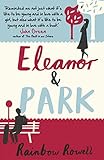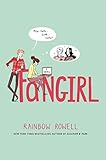 If I had had Rainbow Rowell’s books in high school, things would have been a lot easier. Her two young adult novels are about girls who don’t fit in. Eleanor, in Eleanor & Park, is a big girl with ugly clothes and a dysfunctional family who doesn’t have any friends. Cath, in Fangirl, is a bookish college freshman with intermittent social anxiety issues who feels most comfortable in an online fan community. Both books are about how falling in love for the first time, particularly if you’ve never seen a love story you can relate to, can be as terrifying and confusing as it is joyful.
If I had had Rainbow Rowell’s books in high school, things would have been a lot easier. Her two young adult novels are about girls who don’t fit in. Eleanor, in Eleanor & Park, is a big girl with ugly clothes and a dysfunctional family who doesn’t have any friends. Cath, in Fangirl, is a bookish college freshman with intermittent social anxiety issues who feels most comfortable in an online fan community. Both books are about how falling in love for the first time, particularly if you’ve never seen a love story you can relate to, can be as terrifying and confusing as it is joyful.
Eleanor meets Park meet when forced to sit next to him on the bus to school every day. After several daily rides pass in silence, Park notices Eleanor reading his comic book over his shoulder, and the next day he lends it to her. The comic book swapping leads to mixed tapes which leads to exchanging actual words which leads to hand-holding. As John Green put it in his New York Times review of the book, “The hand-holding, by the way, is intense.” Both of them, Eleanor to a much graver degree, are having trouble at home, but 20 minutes of hand-holding to and from school every day becomes the most important thing in their lives.
When I was in eighth grade I had a crush on the guy who sat behind me in English. He was popular and I was not, but we were passably friendly, and I could count on three or four good interactions per class. We had a running joke where every time he asked me to borrow a pen I’d give him my girliest one. Then he’d say, “my favorite,” and I’d do my best not to jump over my desk and kiss him on the face. When I woke up in the morning, my first thought was of sixth period English. I picked out my outfits with sixth period English in mind, and an internal clock in the pit of my stomach always knew how far away it was. Then I’d go to English, do the pen joke, try to hit a few under-the-breath jokes about our teacher out of the park, and the clock would reset. (My eighth grade dreamboat went on to date a blond sophomore. He now resides in Michigan.)
This emotionally heightened singleness of mind is what Rowell captures perfectly; the way falling in love with someone makes you an antenna tuned to their every word, look, movement, shift of weight, new shirt, old shirt, real smile, fake smile, and quirk. I was swept up in it as well, dying to know what happened the next time they got on the bus and then, as their relationship moved beyond the bus rides, deepened and was threatened, dying to see them make it. Rarely is a realistic love story a page-turner, but when I got to the end I tweeted: “Stayed up til 3 finishing Eleanor & Park by Rainbow Rowell. Would have stayed up forever.”
 While Eleanor & Park focuses mostly on the romance and those sweet, sweet bus rides, Fangirl throws Cath into a wider arena. As a high schooler, Cath was a dedicated fangirl of Simon Snow, the wizard hero of a popular series of books who is obviously standing in for Harry Potter. With the occasional help of her twin sister, Wren, Cath writes the most popular novel-length Simon Snow fanfiction in the fandom, such that to a certain subculture she is, as they say, kind of a big deal.
While Eleanor & Park focuses mostly on the romance and those sweet, sweet bus rides, Fangirl throws Cath into a wider arena. As a high schooler, Cath was a dedicated fangirl of Simon Snow, the wizard hero of a popular series of books who is obviously standing in for Harry Potter. With the occasional help of her twin sister, Wren, Cath writes the most popular novel-length Simon Snow fanfiction in the fandom, such that to a certain subculture she is, as they say, kind of a big deal.
Between writing with her sister and taking care of their single father, whose mental stability comes and goes, Cath loves her small, comfortable world. She thought she could take her twin loves — writing and family — with her when she starts at the University of Nebraska, but Wren doesn’t want to be her roommate and her writing professor is none too impressed with fanfiction. Feeling untethered, she’s now dealing with an intimidating roommate, an emotionally unstable father she can no longer keep an eye on, an eager fanbase, demanding professors, and two adorable but confusing boys. While she has a love story of her own that’s as expertly drawn as Eleanor’s, her story is also about moving away from her childhood. But does wanting to be around your family really make you a loser? Does loving something when you were a child automatically make it childish?
Not everyone dreams of leaving the nest and becoming a new person, meeting handsome young gentleman and going on adventures. For shy girls who are really into YA, entering a world of frat parties and 100-student intro classes isn’t liberation, and Rowell is extraordinarily sensitive to how blithely Cath’s new environment makes her feel like a failure. Everyone in Cath’s life is telling her to move on and grow up, to forget about Simon Snow and let her dad take care of himself and let Wren do her own thing. Everyone is telling her — quite rightly — to enjoy herself at college, but what Cath stubbornly believes — also quite rightly — is that it can’t be as simple as that. She’s being told that she needs to change, but not finding the reasons compelling. She wants to cling to her family and her involvement in fandom because they’re comfortable, yes, but also because they’re immensely important to her. Fangirl is about her realizing what you need to let go of in order to move forward, and what you shouldn’t be willing to give up.
While both Eleanor and Cath shy away from other people, Eleanor does so more out of embarrassment, Cath out of fear. In both cases, the bridge they find between themselves and the outside world is a special boy. Those boys, and the way they fall in love with Eleanor and Cath, are the stuff of classic love stories (Fangirl, too, was a book I stayed up well into the small hours to finish). But they never overshadow the complicated, talented, sensitive, stubborn, regretful, funny, obsessive, petrified but hopeful girls. On Rowell’s website, she says her books are about “people who feel like they’re screwing up. And people who fall in love.” They do a lot of both.








